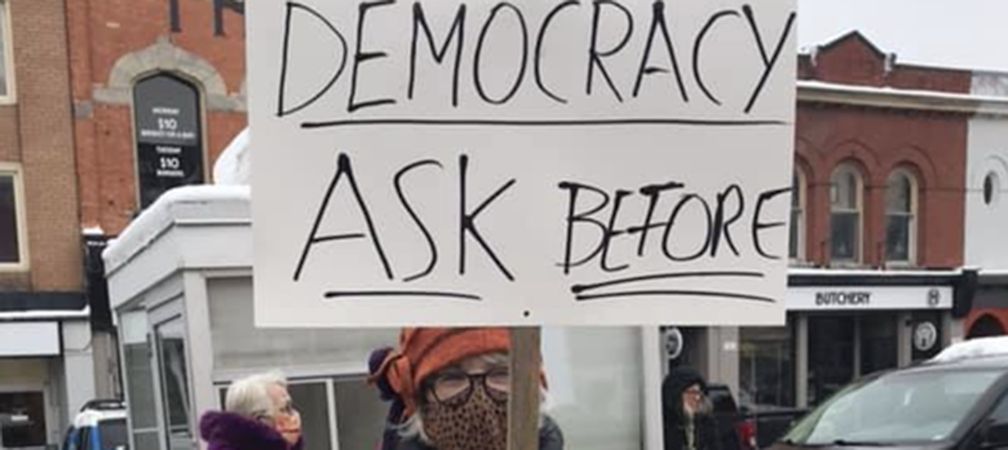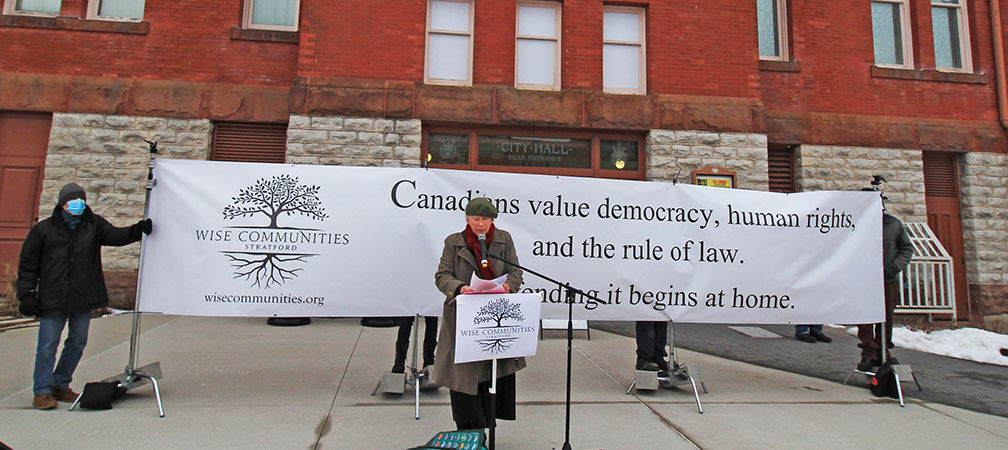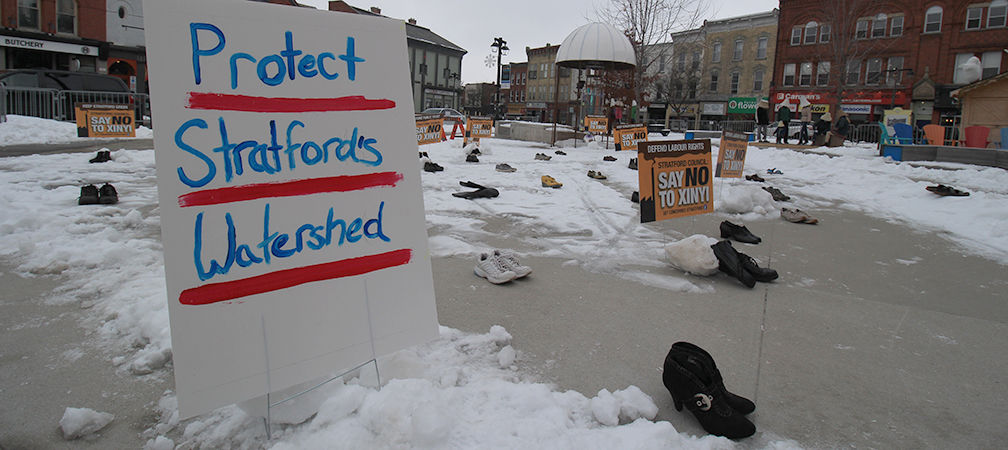Ontario Nature Blog
Receive email alerts about breaking conservation
and environmental news.
© Lora Denis
Rally opposing Stratford glass factory MZO © Mark McCauley
Stratford is one of the many communities across Ontario struggling with the unwelcome imposition of a Minister’s Zoning Order (MZO) to fast-track development. In Stratford’s case, the MZO is to make way for a glass factory on 175 acres of prime farmland at the edge of the city.

Issued by the Minister of Municipal Affairs and Housing, MZOs override requirements for public consultation under the Planning Act and the Environmental Bill of Rights, 1993. They’re thus a tool that allows the government to escape public notice and scrutiny when it approves the destruction of precious wetlands, forest and farmland. And once an MZO is in place, the public has no opportunity for appeal. As noted by the Auditor General of Ontario, there has been a “sharp increase” in the use of MZOs over the past year. This includes the Stratford MZO issued in July, 2020.

The Stratford MZO story begins somewhat earlier in November 2018, when the municipal government quietly signed a letter of intent with Xinyi Canada Glass Limited to build the factory. That letter, as well as the city’s correspondence with the provincial government regarding the MZO, have been shrouded in secrecy. As noted by local farmer, Jamie Gibb, prior to the approval of the MZO, “there were no Planning Act applications, no notices relating to a potential change in zoning, no reports and no public meetings or information sessions relating to the glass plant.”

But late last year, when Stratford residents discovered what was happening, their response was fast and furious. Two community groups quickly emerged to raise awareness and oppose the MZO – Get Concerned Stratford and Wise Communities, the latter founded by singer and song-writer Loreena McKennitt.
Coordinating their efforts, the two groups have commissioned research on environmental impacts; raised awareness through social media, videos, lawn signs and pamphlets; conducted polling; and organized public demonstrations. Residents Lesley Walker Fitzpatrick and Peggy Coffey have also organized a daily vigil (every day except Sunday) on the front steps of City Hall. People drop by to discuss the issues and record video comments for social media.

The issues of concern highlighted by the groups include: the loss of prime farmland, air pollution (including a dramatic increase in greenhouse gas emissions), impacts on local water supplies, and lack of consultation with Indigenous peoples. They have garnered considerable attention from local and national media, ensuring that elected officials are feeling the heat. Indeed, according to their polling:
Little wonder that Mayor Dan Mathieson voiced regret to the CBC in December about his decision to seek the MZO: “Seeing the challenge it has brought to the community, there’s some concern around it … I think it’s safe to say we would probably love to rewind and work at this again. … I’m sure everyone would have liked to have this done differently.”
Stratford Council has yet to make a final decision on the glass factory, citing the provincial lockdown and emergency stay-at-home order as the reason for delay.

Meanwhile, despite the limitations on public gatherings due to the COVID-19 pandemic, Get Concerned Stratford and Wise Communities continue to make their message heard. In January, for example, they organized a novel and visually striking “boots on the ground” rally, inviting people to “stand” in Market Square by sending a pair of shoes or boots to attend the event in their place.

It is exactly this sort of grassroots ingenuity, determination and leadership that are needed to turn the tide on the unwanted proliferation of MZOs that threaten farmland and natural areas across Ontario. Kudos to the people of Stratford for setting such a shining example of resistance!
What you can do: Call on the Government of Ontario to stop the use of MZOs to fast-track development.

Gananoque Lake Nature Reserve © Smera Sukumar
In this time of the pandemic there is even more need for full exploration and full consultation on designs to industrialise and expand territory . All consideration must be given to affected communities and to the degree of pollution and loss of valuable land before projects are approved.
The Stratford area is set in the midst of some of the finest agricultural land in Ontario. I share the deep concern of the citizens there regarding the use of an MZO to fast-track approval of the factory proposal. The cultural heritage of the area would likely also be detrimentally effected by the addition of the proposed glass factory.
It’s all part of the current provincial gov’t motto: open for business. Never mind if it destroys environment and pollutes water or air. If there is pushback from Indigenous people it can lead to a confrontation, as we saw at Oka and the Wasaga area, as well as ongoing protests at Six Nations and in the City of Ottawa with the Algonquin nation.
I spent much of my life living and working in the Stratford area. It is set in the midst of some of the finest agricultural land in Ontario. I share the deep concern of the citizens there regarding the use of an MZO to fast-track approval of the factory proposal. The cultural heritage of the area would likely also be detrimentally effected by the addition of the proposed glass factory.
Stratford is my birthplace and home for my first 28 years of life. Although I live a distance away now, I am horrified that the Mayor and City Council would, for one second, ever think this was a good idea for this small Ontario Theatre town.
If it is allowed to happen, say good bye to the Shakespearian Festival.
Very typical action by a government that has no concern for the will of its residents or care for the environment of the future. It is all about money and no concern for the air we breath or the environment that we live in. This government will only be happy when Southern Ontario is a paved parking lot.
I sent a lot of work to Wellington when they wanted to put plant in there. I object strongly to the tap being turned on and then turned off 20 yrs later sent specs on float glass plant. I will root round for it. Need to add to the objections the bad bldging design with mass float glass requirements which is being driven in Toronto